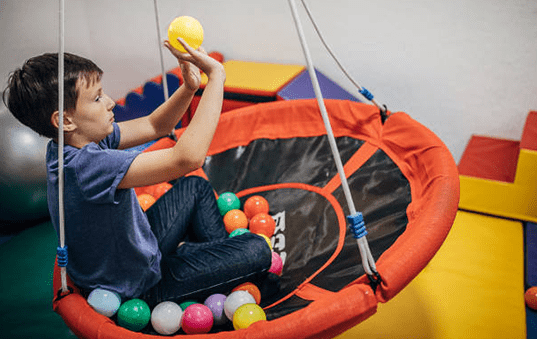Choosing The Right Environment For
ABA Therapy

When it’s time to choose the right ABA therapy environment for your young learner, there are different benefits to consider when deciding if therapy happens at a full-time ABA therapy center or at home. While we always tailor ABA therapy goals to each child, research shows there are key environmental factors in maximizing each child’s experience. Every family should assess their own dynamics to determine where therapy takes place.
Ask yourself these questions to help determine where your child will thrive:
Home-Based Benefits
The main benefits of being home for therapy include convenience, the opportunity to address behaviors such as dressing oneself that mostly occur at home, family involvement, and of course, being in a familiar environment. However, most families do not stay home 100% of the time and more so, want their child to build skill sets to function successfully with peers and other grownups beyond the home setting. So, now let’s explore the benefits of an ABA therapy center.


Center-Based Benefits
At Ally Behavior Centers, we clearly understand that every child and family come with unique needs. We focus on an early intervention center-based model because of its proven advantages and the impact full-time therapy can have on a child between the ages of 18 months and 6 years. Our ABA therapy center enrolls clients full-time, 9 am to 5 pm, to maximize medically necessitated treatment recommended by each child’s diagnosing physician. Our time together allows for thoughtful transitions between a variety of structured and natural learning environments that aid in generalization of skills. This method helps prepare each child to behave a certain way no matter where they are, school, restaurant, home or church.
Why All Day? Why A Center?
Because consistently investing in full-time relationships + routines + reinforcement make an enormous difference in progress for a child with autism. Center-based ABA therapy naturally introduces variables throughout the course of a day that cannot be duplicated at home. Exposure to these opportunities and the day-long routines facilitates a variety of new skills. This also exposes children to peers, group learning, and a mix of therapist styles. At Ally Behavior, children who need speech and occupational therapy can receive it during their regular therapy hours, saving families time in managing complex schedules, a variety of providers, and fitting extra driving into their busy schedules.
While the idea of full-time therapy can feel overwhelming at first, it’s exactly the type of intensive therapy children with autism need at this age to make progress that lasts the rest of their lives.
At the center, we pair children with a team of therapists supervised by a BCBA. They rotate within their team throughout the day maintaining the benefit of 1:1 therapy at all times while gaining skills to interact with individuals who look and sound different from each other.
To put it simply, we believe the advantages of center-based therapy outweigh the conveniences of being home and we aren’t the only ones who think this way!
When your child is at an ABA therapy center all day, this prepares them best for real-world experiences with an emphasis on social skills and transitioning to academic environments. Numerous studies show that early intensive center-based ABA therapy leads to significantly better developmental outcomes for young children with Autism Spectrum Disorder (ASD) as well as parent perceived competence improved quality of life.
Research also shows that center-based programs tend to have a more robust parent training program compared to home-based programs. Additionally, center-based therapy more effectively increases parents' resilience and satisfaction with disability support, Stokes and Baer 1977, “Train and Hope”.